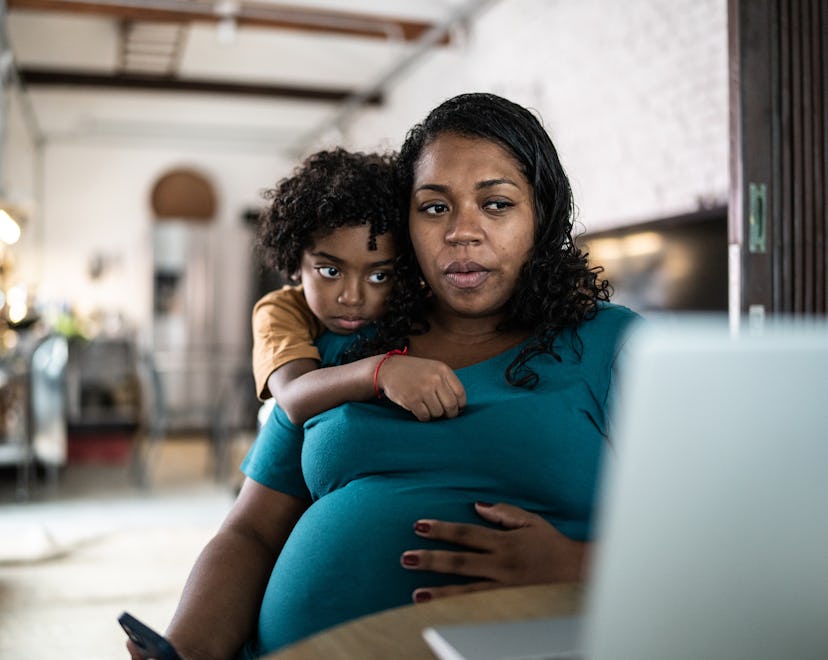Labor

Could Increased Anxiety Mean You'll Go Into Labor Soon? Experts Explain
It’s normal to be a little nervous. But seek help if your anxiety is severe.
Thanks to movie and TV representations of childbirth, most people are familiar with the more “traditional” signs of labor — water breaking, back pain, contractions. But, anecdotally, many people that have given birth talk about ‘softer’ signs of labor — things like having had an uneasy feeling before labor or being restless the night before having their baby. Is increased anxiety a sign of labor? Here, perinatal care experts help us decode what’s going on if you’re feeling extra anxious close to your due date.
Does heightened anxiety mean labor is coming?
“It's not in the textbooks,” Dr. Karen Duncan, an OB-GYN and assistant professor in the Department of Obstetrics and Gynecology at NYU Langone Health, tells Romper. Still, there may be more to this than what we currently recognize, Duncan feels, saying that many of the mental symptoms of labor are overlooked or ignored.
Anxiety is not an officially recognized sign of labor, Duncan explains, but she also thinks “it’s likely that when women are getting into really early labor they do have some anxiety and heightened awareness,” she says. “It's probably the subconscious recognition of something going on in your body, maybe before you even mentally realize you're having cramps or you're having some back pain. It could be one of the earliest signs of something going on.”
Having a sense of worry during pregnancy, particularly as labor approaches, is common. “Many people about to deliver a baby are anxious about labor and new parenthood, and many feel anxious as they approach delivery,” Amanda Tinkelman, a Brooklyn-based psychiatrist and certified perinatal mental health specialist, tells Romper. Most parents could probably talk about a time during their pregnancy where they became more anxious than usual — some don't feel ready, or feel ready but fear for the worst from a medical point of view. This kind of increased anxiety is typical, Tinkelman says.
“There's a lot of unknowns,” Duncan confirms. “Labor itself is a complete lack of control... Not knowing when you're going into labor alone... is extremely anxiety provoking for some women.”
It’s normal to have uneasy feelings before labor
For many pregnant people, prenatal anxiety will not reach a level that needs treatment. A little anxiety is normal. However, many pregnant people do experience prenatal anxiety that would benefit from therapy and treatment. If troubled or worried thoughts are affecting your quality of life by becoming persistent, inconsolable, and/or irrational, you should seek support. But both Duncan and Tinkelman agree that anxiety disorders in pregnancy have historically been under-reported.
“In the past, people would be more aware of postpartum depression as a potential complication of pregnancy,” Tinkelman explains. “Many people develop symptoms during pregnancy, not just postpartum, and many develop anxiety symptoms, and not just depressive symptoms. For this reason, the currently preferred term to identify these most common complications of childbearing is perinatal mood and anxiety disorders, abbreviated to PMADs.”
Both Tinkelman and Duncan say that while those with a pre-existing anxiety disorder are at heightened risk of anxiety during pregnancy, the development of an anxiety disorder during this time is not uncommon and multi-factorial. Changes in sleep patterns, psycho-social stresses about motherhood, adjusting to bodily changes, past trauma(s), and hormones, may all contribute.
“Hormones add to [anxiety],” explains Duncan, which is why she says women with a personal or family history of anxiety disorders should be aware of their increased risk during pregnancy.
How to deal with anxiety before labor
If you’re suffering from increased or new anxiety during pregnancy, Duncan is clear about what you need to know: “There is help. You don't have to suffer in silence.” Many SSRIs are safe to take during pregnancy, and therapy is always a wonderful idea for anyone going through a major life transition — which pregnancy and new parenthood certainly is.
Duncan also says that optimizing sleep, gentle exercise, yoga, acupuncture, talk therapy, childbirth classes, support groups for pregnant people, and medication are all treatments that can help. “There's definitely not a one-size-fits-all solution," she continues, "but there are a lot of possible solutions.”
Don’t ignore feelings of anxiety. One study published in Women and Birth: Journal of the Australian College of Midwives, found that “experiencing psychological distress such as depression, anxiety, and/or perceived stress during pregnancy may increase the risk for adverse birth outcomes, including preterm birth.”
There's a lot even experts don't understand about anxiety, particularly during pregnancy and including, yes, whether that increasing sense of dread you're feeling as your due date nears is a sign of labor, or if it's the thought of labor that's fueling your anxiety. But based on what is known, either is possible. And, fortunately, we're learning more every day thanks, in no small part, to the fact that we're talking about it.
“There's been a bit of a stigma attached to... anxiety, but there shouldn't be,” says Duncan. “The more we talk about it, the more we de-stigmatize it.”
Study referenced:
Aleksandra Staneva, Fiona Bogossian, Margo Pritchard, Anja Wittkowski, The effects of maternal depression, anxiety, and perceived stress during pregnancy on preterm birth: A systematic review, 2015
Experts:
Dr. Karen Duncan, an OB-GYN and assistant professor in the Department of Obstetrics and Gynecology at NYU Langone Health
Amanda Tinkelman, a Brooklyn-based psychiatrist and certified perinatal mental health specialist
If you or someone you know is experiencing depression or anxiety during pregnancy, or in the postpartum period, contact Postpartum Health Alliance at (888) 724-7240, or Postpartum Support International at (800) 944-4773. If you are thinking of harming yourself or your baby, get help right away by calling the National Suicide Prevention Lifeline at 1-800-273-8255, or dialing 911. For more resources, you can visit Postpartum Support International.
This article was originally published on